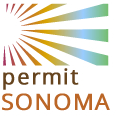- Agricultural Preserve
- Building & Grading Plan Check
- Building Inspection
- Cannabis Program
- Certificates of Compliance
- Coastal Permit
- Code Enforcement
- Design Review
- Encroachment
- Fire Prevention & HazMat
- Grading, Flood & Storm Water
- Planning
- Public Sewer
- Solar Permits
- Subdivision
- Subdivisions and Survey for Engineers and Surveyors
- Well and Septic
- Use Permits
- Zoning Permits
- Zone & Land Use Changes
- Back to Instructions and Forms
PJR-091 Landscape Plan Check Water Efficient Landscape Regulations

Information regarding the implementation of the Water Efficient Landscape Ordinance in Section 7D3 of the Sonoma County Building Regulations.
Background
The Ordinance, effective January 15, 2010, was adopted in response to AB 1881 (2006) which required the California Department of Water Resources to prepare a Model Water Efficient Landscape Ordinance to be adopted by all local governments. The Sonoma County Water Efficient Landscape Regulations have been found consistent and as effective as the Model Ordinance. The Ordinance establishes a structure for planning,designing, installing, maintaining and managing water efficient landscapes with the main purpose of reducing the amount of water used for landscape irrigation. Both public water users and groundwater users are subject to the ordinance.
A Landscape Plan Check is required for landscaping associated with the following projects requiring a building, grading, or design review permit:
- Commercial and Industrial
- Public
- Multi-family Residential
- Developer Installed Residential
- Homeowner provided and/or homeowner-hired residential projects that include buildings or additions over 400 square feet, except where all of the following are met:
- The landscape area is less than 5,000 square feet;
- Turf is limited to no more than 600 square feet; and
- An irrigation system is installed and operated by a weather-based self-adjusting irrigation controller with a rain sensor.
Procedure
After a complete application is submitted, a Project Planner will be assigned. The landscape plan check will be processed administratively. The landscape plan check must be approved for issuance prior to associated permit(s) issuance.
A final inspection, by Permit Sonoma Planning staff, is required to verify the installation of the landscape and irrigation system prior to final inspection of associated permit(s). In addition, a Certificate of Installation PJR-092 (PDF: 111 kB) must be completed by the property owner and landscape designer or installer.
Required Application Materials
In order to expedite our review of the application, provide the following items. The number of copies required is indicated where multiple copies are required. The application will not be accepted unless all required materials are provided.
- Applications: Planning Application form PJR-001(PDF), signed by all property owners, and Indemnification Agreement form PJR-011, (PDF) signed by the applicant.
- Maximum Applied Water Allowance (MAWA) Worksheet (PJR 092- Landscape Certificate of Compliance). Two copies must be included with the application package. The MAWA is based upon the Reference Evapotranspiration Table, the ET Adjustment Factor, and the size of the landscape area. The estimated total water use shall not exceed the MAWA. Please note, Special Landscape Areas, including recreation areas, are subject to the MAWA with an ET adjustment factor not to exceed 1.0.
Reference Evapotranspiration (ETO) (The values in this table were derived from the California Irrigation Management Information System (CIMIS).)- Bennett Valley - 44.4
- Cloverdale - 40.7
- Fort Ross - 31.9
- Healdsburg - 31.9
- Petaluma - 39.6
- Santa Rosa - 42.0
- Valley of the Moon - 46.1
- Windsor - 44.2
- Landscape Design Plan. Provide two full-sized copies of the landscape design plan. This should clearly define the landscape planting design plan that accurately depicts the following:
- new and existing trees, shrubs, groundcovers, turf, and any other planting areas;
- delineate all hydrozones grouped by water needs;
- plants by botanical name and common name separated by water needs;
- plant sizes and quantities;
- property lines, new and existing building footprints, streets, driveways, sidewalks, and other hardscape features;
- pools, fountains, water features
Include the total planned square footage of planted areas for high water use plants (i.e. turf, annuals and container plants); moderate water use plants (i.e. ornamental trees, shrubs, ground covers, and perennials primarily irrigated by sprinklers); and low water use plants (i.e. drought tolerant plants irrigated primarily through drip emitters). The planting plan must include specific plant names that fit in each category.
- Irrigation Design Plan. An irrigation design plan which describes irrigation methods and design actions that will be employed to meet the irrigation specifications required by the Water Efficient Landscape Regulations. The irrigation plan drawn at the same scale as the planting plan that:
- Accurately and clearly identifies and depicts irrigation system point of connection;
- Accurately and clearly identifies and depicts irrigation system components, e.g. controller, pipe, remote-control valves, sprinklers, and other application devices, rain shutoff device, check values, pressure regulating devices, backflow prevention devices.
- Includes the Hydrozone Table
The following Information must appear on all landscape and irrigation plans:
Hydrozone Complete for all Vales:
- List each Vale
- Irrigation Method (Spray, drip, etc) per vale
- Plant Type (high, moderate, low) per valve
- GPM (Gallons per minute) per vale
- Precipitation Rate (in/hr) per valve
- Area (ft2) per vale
- % of Landscape per vale
The following tables must appear on all landscape and irrigation plans:
Hydrozone Table – Complete for All Valves
| Valve No. | Irrigation Method (Spray, Drip, etc.) | Plant Type (High, Mod., Low) | GPM | Precipitation Rate (in/hr) | Area (ft2) | % of Landscape |
|---|---|---|---|---|---|---|
| 1 | ||||||
| 2 | ||||||
| 3 |
Summary Hydrozone Table
| Plant Type | Area (ft2) | % of Landscape |
|---|---|---|
| Low Water Use | ||
| Moderate Water Use | ||
| High Water Use | ||
| Total |
Filing Fee
See the current Permit Sonoma Project Review Fee Schedule.

 Translate
Translate